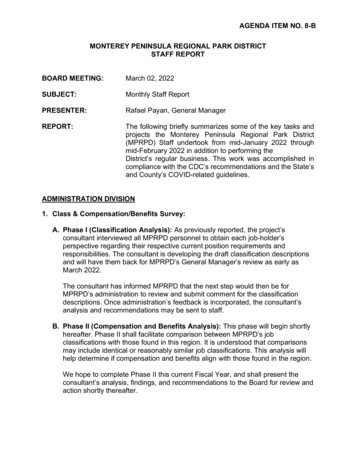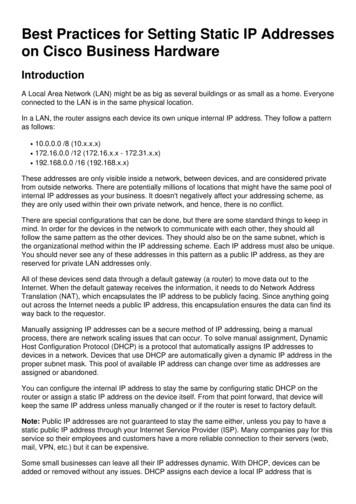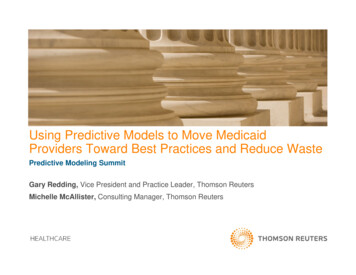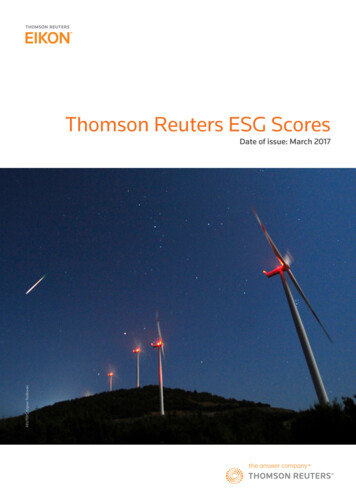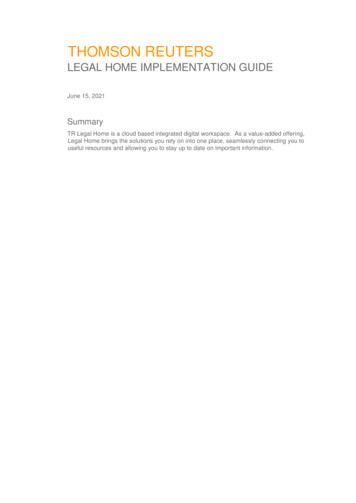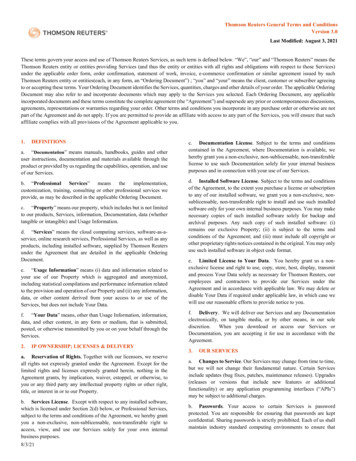
Transcription
Case 5:20-cv-00135-RWS Document 19-2 Filed 10/02/20 Page 1 of 19 PageID #: 84EXHIBIT 1
Case 5:20-cv-00135-RWS Document 19-2 Filed 10/02/20 Page 2 of 19 PageID #: 85Opinion and Orderl 5-Cl-01117COMMONWEALTH OF KENTUCKYFRANKLIN CIRCUIT COURTDIVISION IIENTEREDCIVIL ACTION No. 15-Cl-01117FRANKLIN CIRCUIT COURTAMY FELDMAN, CLERKFINANCE AND ADMINISTRATION CABINETCOMMONWEALTH OF KENTUCKYDEPARTMENT OF REVENUEAUG 2 3 2016PETITIONERvs.RESPONDENTNETFLIX, INC.OPINION AND ORDERThis matter is before the Court upon Petitioner's Petition for Review of Decisionof the Kentucky Board of Tax Appeals. Upon review of the parties' briefs and papers,and after being sufficiently advised, this Court hereby AFFIRMS the Final Order of theKentucky Board of Tax Appeals.STATEMENT OF FACTSThis case is an appeal from a final decision of the Kentucky Board of TaxAppeals (hereinafter "KBTA"). The case involves the application of the following taxingstatutes: KRS 136.604 (the "Excise Tax")1, KRS 136.616 (the "Gross Revenues Tax")2,and KRS 160.614 (the "School Tax")3. Respondent, Netflix, Inc. (hereinafter "Netflix")filed refund claims for amounts paid pursuant to the taxes imposed pursuant to KRS136.604(1), KRS 136.616(2), and KRS 160.614(6). Petitioner, Commonwealth of1The Excise Tax, KRS 136.604(1), provides that it is imposed on the "retail purchase of multichannelvideo programming service provided[.]"2 The Gross Revenues Tax, KRS 136.616(2), provides that a tax is imposed on the provider's grossrevenues, "received from the provision of multichannel video programming services[.]"3The School Tax, KRS 160.614(6), provides that it "shall include the gross receipts derived from thefurnishing of multichannel video programming service[.]"1 of 18
Case 5:20-cv-00135-RWS Document 19-2 Filed 10/02/20 Page 3 of 19 PageID #: 86Opinion and Order15-Cl-01117Kentucky, Finance and Administration Cabinet, Department of Revenue (hereinafter"Revenue"), denied Netflix's refund claims. Netflix appealed the denied refund claims tothe KBTA. In its September 23, 2015 Final Order, the KBTA reversed Revenue's finalrulings which had required Netflix to pay 259,610.57 for the Gross Revenues Tax andExcise Tax, and 110,007.89 for the School Tax. The KBTA found that Netflix did notqualify as a "multichannel video programming service," rendering the taxing statutesinapplicable and entitling Netflix to a refund of taxes paid pursuant ,to these statutes. Thisappeal followed timely.ANALYSISI. Standard of ReviewKRS 131.370(1) grants any party aggrieved by a final order of the KBTA anopportunity to seek judicial review. In reviewing an agency decision, this Court may onlyoverturn that decision if the agency acted arbitrarily or outside the scope of its statutoryauthority, if the agency applied an incorrect rule of law or if the decision itself is notsupported by substantial evidence on the record. See Kentucky State Racing Commissionv. Fuller, 481 S.W.2d 298, 301 (Ky. 1972); see also Kentucky Board of Nursing v. Ward,890 S.W.2d 641, 642-43 (Ky. Ct. App. 1994). "Judicial review of an administrativeagency's action is concerned with the question of arbitrariness." Commonwealth,Transportation Cabinet v. Cornell, 796 S.W.2d 591, 594 (Ky. Ct. App. 1990), quotingAm. Beauty Homes Corp. v. Louisville & Jefferson County Planning & Zoning Comm'n,379 S.W.2d 450, 456 (Ky. 1964).Arbitrariness means "clearly erroneous, and by'clearly erroneous' we mean unsupported by substantial evidence." Crouch v. PoliceMerit Board, 773 S.W.2d 461, 464 (Ky. 1988). Substantial evidence is "evidence of2of 18
Case 5:20-cv-00135-RWS Document 19-2 Filed 10/02/20 Page 4 of 19 PageID #: 87Opinion and Order15-Cl-O1117substance and relevant consequence, having the fitness to induce conviction in the mindsofreasonable men." Fuller, 481 S.W.2d at 308.If it is determined that the Board's findings are supported by substantial evidence,the next inquiry is whether the agency has correctly applied the law to the facts asfound. Kentucky Unemployment Ins. Comm'n v. Landmark Cmty. Newspapers ofKentucky, Inc., 91 S.W.3d 575, 578 (Ky. 2002); quoting Southern Bell Tel. & Tel. Co. v.Kentucky Unemployment Ins. Comm'n, 437 S.W.2d 775, 778 (Ky. 1969). Questions oflaw arising out of administrative proceedings are fully reviewable de novo by the courts.Aubrey v. Office of Attorney General, 994 S.W.2d 516,519 (Ky. Ct. App. 1998). Whenan administrative agency's findings are supported by substantial evidence, and when theagency has applied the correct rule of law, these findings must be accepted by areviewing court. Ward, 890 S.W.2d at 642.II. Argumenta. Introduction and KBTA ReviewNetflix operates a "streaming service," or "a subscription based service thatstreams digital movie or television content over the public internet for viewing either on atelevision or an electronic device." Joint Stipulation of Facts No. 10. 'J;'he issue presentedis whether Netflix's streaming video service is subject to the Gross Revenues Tax, ExciseTax and the School Tax. Whether or not Netflix is subject to these taxing statutes turnson a determination of whether Netflix's streaming service fits within the definition of a"multichannel video programming service." A "multichannel video programmingservice" is a term of art defined in KRS 136.602(8) as3of 18
Case 5:20-cv-00135-RWS Document 19-2 Filed 10/02/20 Page 5 of 19 PageID #: 88Opinion and OrderJ5-CJ-01117"Multichannel video programming service" means programming providedby or generally considered comparable to programming provided by atelevision broadcast station and shall include but not be limited to:(a) Cable service;(b) Satellite broadcast and wireless cable service; and(c) Internet protocol television provided through wirelinefacilities without regard to delivery technology[.]Revenue insists that Netflix's streaming service is "generally comparable toprogramming provided by a television broadcast station." Revenue cites to the preambleto KRS 136.600 et. seq.,4 in support of the proposition that the General Assemblyintended to encompass streaming services. Netflix disputes this position and argues thatstreaming services are not comparable because the streaming service is not similar to thelinear type scheduled programming provided by television broadcast stations, cable TVor live programming. Moreover, Netflix argues that "multichannel video programming"is a term of art used in FCC statutes and that streaming services are not considered to beincluded as multichannel video programming by the federal government or any otherstate which adopts the term of art in its statutory scheme.As stated above, Netflix initially reported and remitted the taxes for the period ofJune 2012 through August 2012 to Revenue and thereafter filed a claim of refund onMarch 21, 2013. Revenue denied the refund requests by letters dated August 7, 2013 andAugust 16, 2013. Netflix filed protests to the denials, and on October 16, 2013, Revenueissued its Final Ruling sustaining the denials. On November 12, 2013, Netflix appealed tothe KBTA. After conducting an evidentiary hearing on October 21, 2014 and a4KRS 136.600 states the purpose of the statutory scheme of KRS 136.600 et. seq., as "[overcoming]limitations placed upon the taxation of communications service by federal legislation that has resulted ininequities and unfairness among providers and consumers of similar services in the Commonwealth [. ][and] [providing] enough flexibility to address future changes brought about by industry deregulation,convergence of service offerings, and continued technological advances in communications[.]" KRS136.600(2) and (4).4of 18
Case 5:20-cv-00135-RWS Document 19-2 Filed 10/02/20 Page 6 of 19 PageID #: 89Opinion and Order15-Cl-01117supplemental hearing on July 29, 2015, the KBTA issued its Final Order reversingRevenue's denial of Netflix's claim of refund. The KBTA framed the questionedpresented as "[ .] determin[ing], by the plain meaning of Kentucky's statute, whetherthe legislature manifested an intention to include streaming services in the excise taxationscheme," Final Order at 3. In the Final Order, the KBTA, finding for Netflix, concludedthat Netflix does not fit within Kentucky's definition for "multichannel videoprogramming." Thus, the KBTA found the taxing statutes at issue in this case to beinapplicable to Netflix, requiring Revenue to grant Netflix's request for refund. Inreaching this conclusion, the KBTA found unpersuasive Netflix's reference to federalstatutes, regulations and guidelines with respect to Netflix's regulatory status in thefederal scheme, as the Kentucky legislature failed to include reference, definitional orotherwise, to the federal statutory scheme despite demonstration of its ability to do so inthe same chapter of the Kentucky Revised Statutes. See Final Order at 4. Instead, theKBTA engaged ·in a thoughtful discussion the legislative intent behind the relevantstatutes and the definition of "multichannel video programming."Beginning from the position that the statutes in question were unambiguous, theKBTA concluded that the plain meaning of the words should control. See Final Order at4. Applying the plain meaning rule to the relevant statutes, the KBTA focused heavily onthe phrase "generally considered comparable to programming" as used in KRS136.602(8) to define "multichannel video programming service." See Final Order at 5.The KBTA found that Netflix's streaming service offers movies and televisionprogramming that could be watched on broadcast or cable television but concluded thatthe type of programming offered by Netflix is not generally considered to be comparable5of18
Case 5:20-cv-00135-RWS Document 19-2 Filed 10/02/20 Page 7 of 19 PageID #: 90Opinion and Order15-CI-01117to broadcast or cable television programming. See Final Order at 5. While the word"programming" is not defined in the relevant statutes, the KBTA relied upon thedictionary definition of "programming" - "the designing, scheduling or planning of aprogram." See Final Order at 5. Concluding that the term "programming" includes morethan just the content provided but also the manner in which the content is provided, theKBTA ruled that Netflix's streaming service and traditional cable or broadcastprogramming are not things generally considered to be comparable. See Final Order at 5.In support of this position, the KBTA found that "[t]he undisputed testimony presentedwas that Netflix does not provide any live programming, such as sports, news, andawards shows, nor does it provide any linear programming, which means there is a settime schedule for the programming." See Final Order at 6. Acknowledging thesimilarities between video on demand services commonly offered by broadcast or cabletelevision and Netflix's streaming service, the KBTA found the similarity of video ondemand features offered by TV services to be incidental to broadcast and cable televisionprogramming and wholly insufficient to make Netflix's streaming services "generallyconsidered to be comparable" to more traditional cable or broadcast television services.See Final Order at 6. In addition to differing content, the KBTA also noted the differentpresentation method to the consumer: Netflix offers services which can be transmitted tostand alone devices for personal, convenient enjoyment whereas broadcast and cabletelevision require the presence of a television for enjoyment of previously scheduledprogramming which is available when the television is turned on. See Final Order at 6.Even though the KBTA found that Netflix does not provide a service that isgenerally considered to be comparable, the KBTA opined that Netflix could nevertheless6of 18
Case 5:20-cv-00135-RWS Document 19-2 Filed 10/02/20 Page 8 of 19 PageID #: 91Opinion and Orderl 5-Cl-01117be subject to the taxing statutes in question if Netflix's streaming services fall within thestatutory definition of "cable services," which is defined as "the provision of video,audio, or other programming service to purchasers, and the purchaser interaction, if any,required for the selection or use of the video or other programming service, regardless ofwhether the programming is transmitted over facilities owned or operated by the provideror by one (1) or more other communications service providers." See KRS 136.602(1);Final Order at 7. While the parties stipulated that Netflix's streaming services were notcable services, the KBTA briefly analyzed whether the legislature had defined the term"cable services" broadly enough to overcome the parties' stipulation. Followingsupplemental briefing and another hearing, the KBTA concluded Netflix's streamingservices do not fall within the statutory definition of "cable services" within the contextof "multichannel video programming service." For these reasons, as previously noted, theKBTA reversed Revenue's final rulings denying Netflix's claim of refund and grantedNetflix a refund as requested. Revenue timely appealed the KBTA's Final Order.b. Summary of Arguments on AppealIn support of its appeal, Revenue encourages this Court to reverse the KBTA'sFinal Order and conclude that Netflix's streaming service falls within the application ofKentucky's taxing statutes imposed on "multichannel video programming services."Revenue maintains that a plain reading of the statutes in question necessitates theconclusion that the General Assembly intended to include, or leave enough room forgrowth and interpretation, services like Netflix within the definition of "multichannelvideo programming service." Revenue's argument combines consideration of theconcepts of comparability with competition. Revenue takes exception with the KBTA's7of 18
Case 5:20-cv-00135-RWS Document 19-2 Filed 10/02/20 Page 9 of 19 PageID #: 92Opinion and Order15-CI-01117findings - that Netflix's streaming service cannot be considered generally comparable tobroadcast or cable television because Netflix's service does not provide either live orlinear programming - because the KBTA's findings discount the similarities betweenNetflix's services and video on-demand TV features offered by traditional televisionproviders. Revenue insists that Netflix's streaming service is generally consideredcomparable to traditional cable and broadcast television by noting that Netflix's annualreport to the Securities and Exchange Commission identifies Netflix's perceivedcompetitors as including "[m]ultichannel video programming distributors with free TVEverywhere applications such as HBO Go or Showtime Anytime in the U.S. and SkyGoor BBC iplayer in the U.K., and other on demand content from cable providers, such asTime Warner and Comcast; direct broadcast satellite providers, such as DIRECTV andEchostar; and telecommunications providers such as AT&T and Verizon." Revenue'sposition is that Netflix's streaming services are generally considered comparable preambletotheTelecommunications Tax shows the legislature's intent to include streaming services.Revenue's representative stated in his deposition thatWe have broad language that says "shall include" - "multichannel videoprogramming service shall include but not be limited to" - and then it lists[three examples]. [.] The context of the legislation and the context of theamendment to the language was to maintain the stability of our tax baseand to tax products and services that were comparable in a similar fashionand, in other words, in a business or industry that would be in competitionwith cable service or with satellite broadcast [and] wireless cable services,or for that matter, Internet protocol television, that it would fall under theumbrella[.]The plain meanmg of the Telecommunications Tax, according to Revenue,envelopes Netflix's streaming service. This is because the KBTA's conclusion that8 of 18.
Case 5:20-cv-00135-RWS Document 19-2 Filed 10/02/20 Page 10 of 19 PageID #: 93Opinion and Orderl 5-Cl-01117programming must be both live and linear ignores the statutory definition of"multichannel video programming," which does not include such restrictive limitations.Rather, "multichannel video programming" must be constructed broadly, because theGeneral Assembly conveyed its intent that the listed items in KRS 136.602(8) should notbe read as an exhaustive list. Revenue argues that this open ended list, coupled with theexpressed intent and purpose statement contained in KRS 136.600(4), that the enactmentof the 2005 Telecommunications Tax should "provide[] enough flexibility to addressfuture changes brought about by [. ] continued technological advances," requires theCourt to reverse the KBTA and find Netflix's streaming services to be within thestatutory definition of "multichannel video programming."In support of affirming the KBTA's Final Order, Netflix characterizes Revenue'sstatutory interpretation as an expansion of the scope of Kentucky's taxing schemeapplicable to "multichannel video streaming services." Netflix insists that Kentucky'staxing scheme is not sufficiently broad to reach Netflix's streaming service. Because theKBTA reached this same conclusion, Netflix urges the Court to affirm the KBTA's FinalOrder. Netflix characterizes Revenue's position as leading the Court astray, conflatingthe ideas of comparability and competition. While Netflix acknowledges the content ofits annual report to the Securities and Exchange Commission, it also notes that "74% ofsubscribers to the Streaming Service also subscribe to cable, satellite, or IPTV, and theremaining 26% will often supplement their subscription to the Streaming Service with anantenna to access broadcast television programming." Netflix Brief at 5. Rather thanbeing in competition with traditional cable and broadcast television services, Netflixcharacterizes itself as a "supplementary service" carried by a majority of its customers in9of 18
Case 5:20-cv-00135-RWS Document 19-2 Filed 10/02/20 Page 11 of 19 PageID #: 94Opinion and Order15-CI-01117addition to broadcast, cable, satellite or IPTV services. Based on the plain meaning of thestatutory definition and application of the same to the undisputed facts, Netflix arguesthat its streaming service is not generally considered comparable to traditional cable andbroadcast television services. Rather than construing the taxing statutes at issue to coveror apply to any new video service or digital video delivery technology, Netflix urges theCourt to affirm the KBTA's narrow construction of the taxing statutes and grant Netflixits claimed refunds.c. Judicial ReviewThe posture of this case requires this Court to review de novo whether Netflix is amultichannel video programming service-a question the KBTA answered in thenegative-as defined by KRS 136.602(8). Disposition of the . issue before the Courtrequires the Court to construe the statutory definitions and applications with regard to thefacts before the Court. If the Court concludes that Netflix provides a multichannel videoprogramming service, then Netflix is subject to the taxing statutes related thereto, asRevenue concluded in its Final Rulings. If the Court concludes that Netflix does notprovide a multichannel video programming service, then Netflix is not subject to thetaxing statutes related thereto, as the KBTA concluded in its Final Order.When engaging in the exercise of statutory construction, the Kentucky SupremeCourt has stated that "we assume that the '[Legislature] meant exactly what it said, andsaid exactly what it meant.' Only 'when [it] would produce an injustice or ridiculousresult' should we ignore the plain meaning of the statute." Revenue Cabinet v. O'Daniel,153 S.W.3d 815, 819 (Ky. 2005). "The cardinal rule of statutory construction is that theintention of the legislature should be ascertained and given effect." Jefferson County Bd.JO of 18
Case 5:20-cv-00135-RWS Document 19-2 Filed 10/02/20 Page 12 of 19 PageID #: 95Opinion and Order15-CI-01117of Educ. v. Fell, 391 S.W.3d 713, 718 (Ky. 2012). KRS 446.080(1) provides that "[a]llstatutes of this state shall be liberally construed with a view to promote their objectivesand carry out the intent of the legislature." If a statute is reasonably susceptible tomultiple interpretations, courts will reject a construction of a statute that results indiscrimination or yields an absurd result. See, e.g., Atlantic Coast Line R. Co. v. Com.,193 S.W.2d 749, 752 (Ky. 1946).In 2005, the General Assembly established the Telecommunications Tax as a partof the Tax Modernization Act of 2005. The purpose behind the statutory overhaul isevidenced in the five reasons set forth in KRS 136.600: to (1) "[a]ddress an importantstate interest in providing for a fair, efficient, and uniform method for taxingcommunications services," and to (2) "[o]vercome [ ] limitations placed upon the taxationof communication service by federal legislation that ha[ d] resulted in inequities andunfairness among providers and consumers of similar services in the Commonwealth."See KRS 136.600(1), (2). Most likely, the referenced inequities and unfair limitationsrelated to Congress' prohibition upon the taxation of satellite broadcasters by localjurisdictions in the 1996 Telecommunications Act. That Act exempted satellite providersfrom taxation, as opposed to cable service providers which remained subject to taxationby local jurisdictions. Kentucky's 2005 legislation was intended to combat the lostrevenues to local jurisdictions following the inequitable effects of the 1996 federallegislation. A third reason for the enactment of the Telecommunications Tax was to"[p]rovide enough flexibility to address future changes brought about by industryderegulation, convergence of service offerings, and continued technological advances incommunications." See KRS 136.600(4). In 2009, the General Assembly amended the11 of 18
Case 5:20-cv-00135-RWS Document 19-2 Filed 10/02/20 Page 13 of 19 PageID #: 96Opinion and Order15-C/-01117definition of "multichannel video programmmg service" to its present definition; itpreviously had been limited to cable service and satellite broadcast and cable service.Again, a "multichannel video programming service" means programmingprovided by or generally considered comparable to programming provided by a televisionbroadcast station and shall include but not be limited to: a) cable service; b) satellitebroadcast and wireless cable services; and c) internet protocol television providedthrough wireline facilities without regard to delivery technology. See KRS 136.602(8).The parties stipulated and the Board concurred that Netflix's streaming service was notany of the three services identified in KRS 136.602(8). The only questions are whetherNetflix's streaming service is generally considered comparable to programming providedby one of these three services and whether the General Assembly intended to include aservice like Netflix's streaming service within the statutory definition of multichannelvideo programming service.Borrowing from the parties' Joint Stipulation of Facts, the Court observes thatNetflix is a Delaware corporation with its principal place of business in California. Since2010, Netflix has sold a subscription-based service which offers streaming digital movieand television content through the Internet. Netflix's customers pay a monthlysubscription for the streaming service, which allows the customer to search for, select andview movie and television content maintained in Netflix's online library, using devicesowned by the customer, including computers, televisions and personal devices like tabletsand iPhones. Netflix operates a set of Internet cloud services through its website,managed by Amazon Web Services. Customers connect to the server by visiting Netflix'sinternet website or through an application stored on the customer's personal device.12 of 18
Case 5:20-cv-00135-RWS Document 19-2 Filed 10/02/20 Page 14 of 19 PageID #: 97Opinion and Order15-CJ-01117When a customer selects digital content for viewing, the customer's personal deviceinforms the server of the customer's request and then receives the desired content fromone ofNetflix's internet servers.The KBTA focused on several facts contained in the parties' Joint Stipulation ofFacts concerning Netflix's digital content. First, Netflix does not offer or provide contenton any predetermined or set schedule, which is referred to as "linear programming."Customers of Netflix's streaming service must independently contract for Internetservices to enjoy Netflix's online library. Netflix does not own any facilities orinfrastructure capable of transmitting or otherwise delivering its streaming service to itscustomers. Netflix does not bundle or otherwise provide streaming service withinfrastructure capable of delivering content to its customers' devices.Netflix argues that, because the language of KRS 136.602(8) does not impose taxon any service simply because it provides video content, by the Department'sinterpretation of the statute, the Department would enjoy sole and unfettered discretion todetermine which services to tax and which to leave untaxed. This impermissibledelegation becomes murkier, Netflix argues, combined with the lack of indication as towhat the General Assembly meant in the preamble by the phrase ''technologicaladvances." It is true that "multichannel video programming service" as a whole phrase isdefined by KRS 136.602(8). That definition, though, becomes rather unhelpful when oneis tasked with construing the phrase to ascertain the full meaning and decide the questionof whether a service is generally considered comparable to the defined and listedservices. Consultation to a dictionary is required to break down the concepts behind thestatutory definition into the plain meaning of the phrase, which requires analyzing each13 of 18
Case 5:20-cv-00135-RWS Document 19-2 Filed 10/02/20 Page 15 of 19 PageID #: 98Opinion and Order15-Cl-01117individual word used in the phrase. Tax imposition statutes must be construe narrowly,and all ambiguities resolved in favor of the taxpayer-this rule must be followed evenmore closely when the question before the Court is the matter of pointing out the subjectsto be taxed. See WDKY-TV, Inc. v. Revenue Cabinet, 838 S.W.2d 431, 433 (Ky. Ct.App. 1992).Having thoroughly reviewed the KBTA' s factual findings and legal conclusions,the Court is compelled to reach the same conclusion as the KBTA - Netflix does notprovide a multichannel video programming service. Netflix's streaming service does notprovide content in a multichannel format; Netflix's streaming service does not include theconcept of channels. Netflix's content is not linear or sequential programming; thecustomer selects what to view and when. Netflix does not deliver live content; thecustomers cannot view sports, news, weather or award shows. Netflix uses algorithms topreselect content for its customers, on an individual basis, based on previously viewed orexpressed preferences. This is a vast departure from the linear programming model oftraditional cable or broadcast televisions services, where one usually concludes "there'snothing on tv." Contrary to traditional television services, using Netflix enables thecustomer to craft an entirely unique and personal profile and viewing experience. AsNetflix notes, its streaming services allows searches by actor, director, title and cinematicstyle: akin to the days of yore, when one would travel to the local video rental store toselect his or her desired cinematography. Revenue's claim that the KBTA is adding newlimitations or requirements to the statutory definition is misguided. Rather, inascertaining the statutory intent, all the KBTA has done is distill the plain and essentialmeaning from the words used by the General Assembly. The plain meaning of the statute14 of 18
Case 5:20-cv-00135-RWS Document 19-2 Filed 10/02/20 Page 16 of 19 PageID #: 99Opinion and Orderl 5-Cl-01117simply does not support Revenue's construction, and it is unreasonable to conclude thatNetflix's streaming service is generally considered comparable to traditional cable andbroadcast televisions services: the two could not be more different.Revenue's second argument, regarding the legislative intent evidenced by thepreamble, is equally unavailing. In truth, Netflix is in competition with traditional cableand broadcast television services. Netflix may even ultimately render these forms ofentertainment obsolete, as has been the case with historic video rental stores, likeBlockbuster. Regardless of Netflix's ultimate business agenda, it is unreasonable toconclude, as Revenue urges, that the General Assembly in 2005 and 2009 intended to beso wide sweeping in its legislative enactment to subject to taxation every possible newtechnological development in the field of transmitting digital content for personalenjoyment.The first rule of statutory construction requires this Court to ascertain the GeneralAssembly's intent in enacting the Telecommunications Act. Pursuant to KRS 446.080(1),statutes are to be construed liberally to promote the stated objectives and legislativeintent. The Court must look not only to the specific words used, but also to the statutoryscheme as a whole. See County of Harlan v. Appalachian Regional Healthcare, Inc., 85S.W. 3d 607, 611 (Ky. 2002). When the legislature does not define the words employedin a statute, courts attribute the words used with their plain and ordinary meaning,generally after consulting a dictionary. See generally Perdue v. Com., 411 S.W.3d 786,791-792 (Ky. Ct. App. 2013) (turning to dictionary to consider plain meaning of term"effecting an arrest"). In reviewing the entire statutory scheme, it is relevant to considerthe General Assembly's stated purposes. Netflix correctly notes that it is not the role of15 of 18
Case 5:20-cv-00135-RWS Document 19-2 Filed 10/02/20 Page
As stated above, Netflix initially reported and remitted the taxes for the period of June 2012 through August 2012 to Revenue and thereafter filed a claim of refund on March 21, 2013. Revenue denied the refund requests by letters dated August 7, 2013 and August 16, 2013. Netflix filed protests to the denials, and on October 16, 2013, Revenue


